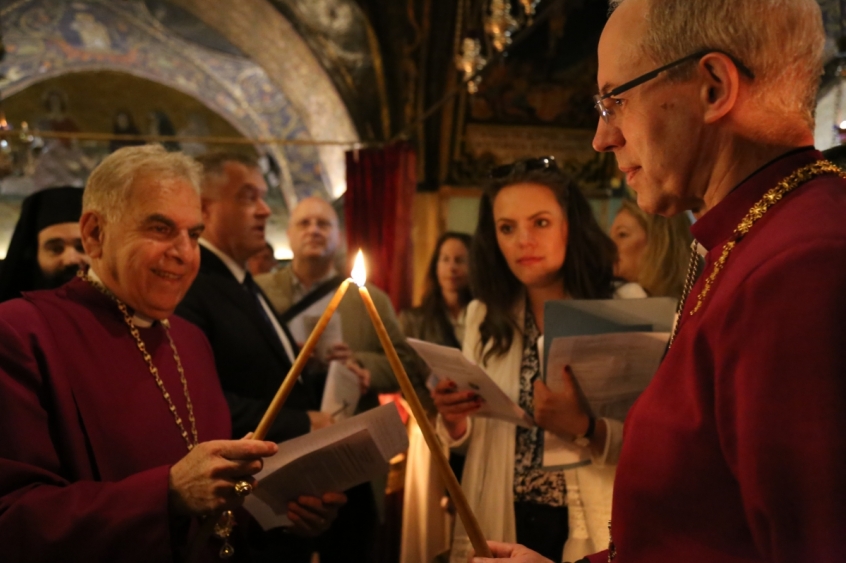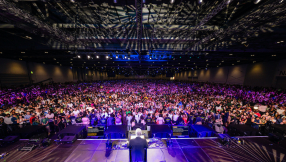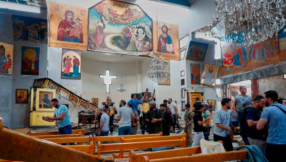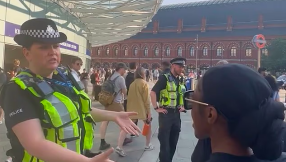
Justin Welby, the Archbishop of Canterbury, has described his 'profound sense of grief and sorrow' after listening to the testimonies of Palestinian Christians whose lives have been affected by the concrete separation wall built by the Israelis near Bethlehem.
After praying for the people of Bethlehem and neighbouring Beit Jala in the shadow of the huge barrier that cuts through the West Bank, Welby said: 'You cannot come and hear the testimonies I heard, you cannot hear from the people who live here, without your heart becoming heavier and heavier, and more and more burdened, with that sense of people whose history has led them to a place where all they have known is disintegrating.'
He added: 'As always in these times, it is the weak, the poor who are shoved to the side. The emotional reaction is one of profound grief and sorrow, and of prayer that there will be justice and security for all.'
Welby, who prayed that God 'give hope to the people of Beit Jala who are faced with so much suffering, anguish and loss', was visiting Bethlehem today as part of his 12-day tour of the Holy Land. Earlier, he toured the Church of the Nativity with the Christian Mayor of the city of Jesus's birthplace, Vera Baboun.
Then, after breakfast with the mayor and representatives of the UK-based charity Friends of the Holy Land, Welby was briefed by the UN on the situation in Bethlehem, where, alongside the wall, Israeli settlements deemed illegal under international law increasingly surround the town.
At the Cremisan valley, home to a community of Salesian monks and nuns, Palestinian Christians told Welby of the impact of the separation barrier following its construction over the past two years after a decade-long court battle.
Welby listened intently as the local mayor, William Shaer, said that one of the oldest Christian communities in the world was struggling for the right to self-determination. 'Today, the vast majority of our people live in the diaspora. But we are staying here. Cremisan has become a symbol for all people,' he said.
Suhaila Abu Sa'ad, 67, said her olive and fruit trees, just 20m from her home but on the other side of the wall, could now be accessed only by a long drive via a checkpoint. 'I can't express how angry I am. Now we depend only on God.'
The wall's construction near Cremisan began in August 2015 at the conclusion of a legal battle waged by the monastery, the convent and local landowners. A gate in the wall, intended to allow farmers to access their land, had never been opened, residents said. In 2004, the International Court of Justice ruled the barrier illegal where it was routed on Palestinian land.
Welby told Cremisan representatives that there were 'limits to what the church can do' and said that he cannot simply tell governments what to do either. But, he said, 'we can speak out and remind people of the need for justice and security'. He pledged to raise his concerns with 'people in power both here and in the UK'.
Earlier, in a joint interview with the Christian Today and the Guardian, the Archbishop said that the three great monotheistic faiths of the Holy Land – Christianity, Judaism and Islam – must find a way of co-existence to avoid 'religious apartheid'.
He said: 'I believe emphatically and determinedly and without hesitation that they must find a way of living together. The idea of a religious apartheid, of separate development, would be a catastrophe because this region sets the pattern for so many other parts of the world.'
Welby added: 'It's going to require enormous leadership from within each of the religious traditions. And it requires a new form of integrity in which religious leaders takes responsibility for failures within their traditions.'
In the past decade or so, 'there's been a total breakdown of the capacity of human beings to live alongside one another. But in the Middle East, it's happened before and it's been put right before, and there have been new moments of hope. So that's our prayer. And that's what we have to take responsibility for leading'.
Asked whether he agreed with those who say that the more you come here, the less you know, Welby agreed.
The Archbishop, who has been listening to disparate voices on his tour of the region, said the time may come when parties seeking a resolution to the Israeli-Palestinian conflict need to include Hamas in talks.
Speaking after a visit to the Hamas stronghold of Gaza last week, Welby said: 'In any place where there's serious conflict, there's a point where you need to talk to everyone, but it has got to be the point where you can make some progress.'
In line with British government policy, the archbishop and his aides did not meet Hamas officials on their brief visit to Gaza. But talks with extremists on both sides of the conflict – Hamas and hardline Israeli settlers – should not be ruled out, Welby said.
'There's a moment, which I'm not saying is now, when it is possible for it to bring rewards. But the moment is not any moment – you can do it at exactly the wrong time and cause a complete meltdown and undermine all the resistance to extremism. And, secondly, the result [can be] the people in the middle become more disempowered, and you end up privileging those who cause the most difficulty, you reward bad behaviour by attention.'
The British government, along with the EU and the US, adopted a policy of not talking to Hamas after the faction won Palestinian elections in 2006 and took control of Gaza the following year. However, some politicians and diplomats now believe that was misguided. Pointing to the experience of the IRA in Northern Ireland, they say there can be no resolution to the conflict without including Hamas in peace talks.
Welby said people in Gaza told him they felt forgotten by the rest of the world. It was 'a place that feels profoundly isolated and besieged... the place where you felt all the problems of the area come together most clearly'.
Beyond humanitarian help, 'there's no obvious fix that is within anyone's grasp at the moment. There are things that governments could do, but they're not practically do-able in the sense that people have the courage or the confidence.'













